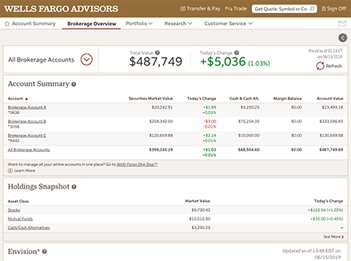
Asset management and wealth management are two terms that are often used interchangeably. Although they both aim to improve your financial situation they have distinct objectives and require different approaches.
Asset managers provide advice to clients on how best to invest their funds. They analyze and research their portfolios and determine which investments are right for them. While some asset managers charge flat fees, others take a percentage from the assets they manage.
Wealth management covers more than just financial planning. It includes credit management, retirement planning, financial advice, and charitable giving. It also offers solutions to protect your wealth, and maximize your returns. Wealth managers are also held to a fiduciary standard. That means they must put their own interests before the interests of their clients.

Asset management is a narrower, more focused service. This service helps wealthy families and individuals to increase and sustain their wealth. This service is often offered by asset management agencies that specialize in rich investors.
These firms work with clients to develop and maintain a diversified portfolio. Additionally, they can recommend other financial products to suit their client’s goals and risk tolerance. These firms may also offer banking services. A growing trend is for compensation to be based upon a performance fee. Every advisor has its own fee structure.
Asset managers often charge a commission on the assets that they manage. Many asset managers have minimum requirements that they must meet to remain in business. Small investors might not be charged the same fees. Some firms offer niche investment services.
Asset managers tend to be more comprehensive and process-oriented than wealth managers. Both offer services but wealth managers have a more holistic approach when analyzing your financial situation. They can make recommendations about where to save money, how much to invest, and how you can achieve your financial goals. A wealth manager will also be able to help you plan for retirement and education, as well as legacy planning.

Unlike asset managers, you don't have to deal with your wealth manager directly. Most of them act as brokers-dealers or financial advisors. Your accounts are managed through a power o' attorney. You can find more information online about the Securities and Exchange Commission's Investment Adviser Public Disclosure, (IAPD), if you are not comfortable with their fees and practices.
Both services have the goal of generating a return. However, wealth management offers a more complete service that can be tailored to your individual needs. This service is particularly helpful for people who are approaching retirement. You must consider your specific needs when choosing between the two. If you have a larger amount of savings and are considering a more aggressive strategy, a wealth manager may be the best choice for you.
Wealth management also seeks to optimize your long-term financial situation. It helps you determine how much you can save, how to invest, and what to do with the rest of your money.
FAQ
How much debt can you take on?
It is vital to realize that you can never have too much money. Spending more than you earn will eventually lead to cash shortages. Savings take time to grow. If you are running out of funds, cut back on your spending.
But how much is too much? There's no right or wrong number, but it is recommended that you live within 10% of your income. Even after years of saving, this will ensure you won't go broke.
This means that, if you have $10,000 in a year, you shouldn’t spend more monthly than $1,000. You should not spend more than $2,000 a month if you have $20,000 in annual income. And if you make $50,000, you shouldn't spend more than $5,000 per month.
The key here is to pay off debts as quickly as possible. This includes credit card bills, student loans, car payments, etc. Once those are paid off, you'll have extra money left over to save.
It would be best if you also considered whether or not you want to invest any of your surplus income. You may lose your money if the stock markets fall. However, if you put your money into a savings account you can expect to see interest compound over time.
Let's suppose, for instance, that you put aside $100 every week to save. In five years, this would add up to $500. Over six years, that would amount to $1,000. You'd have almost $3,000 in savings by the end of eight years. When you turn ten, you will have almost $13,000 in savings.
Your savings account will be nearly $40,000 by the end 15 years. It's impressive. However, if you had invested that same amount in the stock market during the same period, you'd have earned interest on your money along the way. Instead of $40,000, you'd now have more than $57,000.
It's crucial to learn how you can manage your finances effectively. A poor financial management system can lead to you spending more than you intended.
What side hustles are most lucrative in 2022?
The best way to make money today is to create value for someone else. If you do this well the money will follow.
While you might not know it, your contribution to the world has been there since day one. As a baby, your mother gave you life. You made your life easier by learning to walk.
If you keep giving value to others, you will continue making more. The truth is that the more you give, you will receive more.
Value creation is an important force that every person uses every day without knowing it. Whether you're cooking dinner for your family, driving your kids to school, taking out the trash, or simply paying the bills, you're constantly creating value.
In fact, there are nearly 7 billion people on Earth right now. This means that every person creates a tremendous amount of value each day. Even if you created $1 worth of value an hour, that's $7 million a year.
This means that you would earn $700,000.000 more a year if you could find ten different ways to add $100 each week to someone's lives. Imagine that you'd be earning more than you do now working full time.
Let's say that you wanted double that amount. Let's imagine you could find 20 ways of adding $200 per month to someone's lives. You would not only be able to make $14.4 million more annually, but also you'd become very wealthy.
Every day there are millions of opportunities for creating value. This includes selling products, services, ideas, and information.
Although many of us spend our time thinking about careers and income streams, these tools are only tools that enable us to reach our goals. Ultimately, the real goal is to help others achieve theirs.
To get ahead, you must create value. You can get my free guide, "How to Create Value and Get Paid" here.
What is personal finances?
Personal finance involves managing your money to meet your goals at work or home. This includes understanding where your money is going and knowing how much you can afford. It also involves balancing what you want against what your needs are.
If you master these skills, you can be financially independent. This means you are no longer dependent on anyone to take care of you. You can forget about worrying about rent, utilities, or any other monthly bills.
And learning how to manage your money doesn't just help you get ahead. It makes you happier overall. You will feel happier about your finances and be more satisfied with your life.
Who cares about personal finances? Everyone does! Personal finance is a very popular topic today. Google Trends reports that the number of searches for "personal financial" has increased by 1,600% since 2004.
People now use smartphones to track their money, compare prices and create wealth. They read blogs such this one, listen to podcasts about investing, and watch YouTube videos about personal financial planning.
Bankrate.com reports that Americans spend four hours a days watching TV, listening, playing music, playing video games and surfing the web, as well as talking with their friends. It leaves just two hours each day to do everything else important.
Financial management will allow you to make the most of your financial knowledge.
How does rich people make passive income from their wealth?
There are two methods to make money online. Another way is to make great products (or service) that people love. This is known as "earning" money.
You can also find ways to add value to others, without having to spend your time creating products. This is "passive" income.
Let's suppose you have an app company. Your job is to develop apps. But instead of selling them directly to users, you decide to give them away for free. Because you don't rely on paying customers, this is a great business model. Instead, you can rely on advertising revenue.
To sustain yourself while you're building your company, you might also charge customers monthly fees.
This is how internet entrepreneurs who are successful today make their money. They are more focused on providing value than creating stuff.
Why is personal financing important?
Anyone who is serious about financial success must be able to manage their finances. We live in a world that is fraught with money and often face difficult decisions regarding how we spend our hard-earned money.
Why then do we keep putting off saving money. What is the best thing to do with our time and energy?
Yes and no. Yes, most people feel guilty saving money. You can't, as the more money that you earn, you have more investment opportunities.
If you can keep your eyes on what is bigger, you will always be able spend your money wisely.
Controlling your emotions is key to financial success. Focusing on the negative aspects in your life will make it difficult to think positive thoughts.
Unrealistic expectations may also be a factor in how much you will end up with. This is because you haven't learned how to manage your finances properly.
Once you have mastered these skills you will be ready for the next step, learning how budgeting works.
Budgeting is the practice of setting aside some of your monthly income for future expenses. Planning will allow you to avoid buying unnecessary items and provide sufficient funds to pay your bills.
So now that you know how to allocate your resources effectively, you can begin to look forward to a brighter financial future.
What is the easiest passive source of income?
There are tons of ways to make money online. Most of them take more time and effort than what you might expect. How do you make extra cash easy?
Find something that you are passionate about, whether it's writing, design, selling, marketing, or blogging. You can then monetize your passion.
For example, let's say you enjoy creating blog posts. Start a blog where you share helpful information on topics related to your niche. When readers click on the links in those articles, they can sign up for your emails or follow you via social media.
Affiliate marketing is a term that can be used to describe it. There are many resources available to help you get started. Here are some examples of 101 affiliate marketing tools, tips & resources.
A blog could be another way to make passive income. It's important to choose a topic you are passionate about. However, once you've established your site, you can monetize it by offering courses, ebooks, videos, and more.
There are many online ways to make money, but the easiest are often the best. If you really want to make money online, focus on building websites or blogs that provide useful information.
Once your website is built, you can promote it via social media sites such as Facebook, Twitter, LinkedIn and Pinterest. This is what's known as content marketing. It's a great way for you to drive traffic back your site.
Statistics
- These websites say they will pay you up to 92% of the card's value. (nerdwallet.com)
- U.S. stocks could rally another 25% now that Fed no longer has ‘back against the wall' in inflation fight (marketwatch.com)
- According to a June 2022 NerdWallet survey conducted online by The Harris Poll. (nerdwallet.com)
- Shares of Six Flags Entertainment Corp. dove 4.7% in premarket trading Thursday, after the theme park operator reported third-quarter profit and r... (marketwatch.com)
- As mortgage rates dip below 7%, ‘millennials should jump at a 6% mortgage like bears grabbing for honey' New homeowners and renters bear the brunt of October inflation — they're cutting back on eating out, entertainment and vacations to beat rising costs (marketwatch.com)
External Links
How To
For cash flow improvement, passive income ideas
There are ways to make money online without having to do any hard work. Instead, you can make passive income at home.
There may be an existing business that could use automation. Automation can be a great way to save time and increase productivity if you're thinking of starting a new business.
Automating your business is a great way to increase its efficiency. This allows you to spend more time growing your business than managing it.
A great way to automate tasks is to outsource them. Outsourcing lets you focus on the most important aspects of your business. When you outsource a task, it is effectively delegating the responsibility to another person.
You can concentrate on the most important aspects of your business and let someone else handle the details. Outsourcing makes it easier to grow your business because you won't have to worry about taking care of the small stuff.
Another option is to turn your hobby into a side hustle. Another way to make extra money is to use your talents and create a product that can be sold online.
You might consider writing articles if you are a writer. There are many places where you can post your articles. These sites pay per article and allow you to make extra cash monthly.
It is possible to create videos. You can upload videos to YouTube and Vimeo via many platforms. When you upload these videos, you'll get traffic to both your website and social networks.
You can also invest in stocks or shares to make more money. Investing stocks and shares is similar investment to real estate. You are instead paid rent. Instead, you receive dividends.
When you buy shares, they are given to you as part of your dividend. The size of the dividend you receive will depend on how many stocks you purchase.
You can sell shares later and reinvest the profits into more shares. You will still receive dividends.